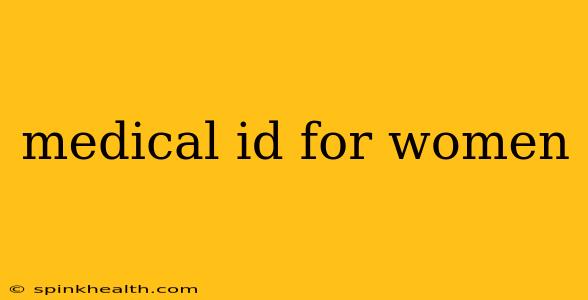For women, carrying a medical ID can be more than just a precaution; it's a powerful tool for safeguarding health and well-being. This isn't just about listing allergies; it's about ensuring crucial information is readily available in emergency situations, potentially saving precious time and even lives. This comprehensive guide explores the importance of medical IDs for women, addressing specific concerns and providing insights into choosing the right option for your needs.
Imagine this: You're involved in an accident, unconscious and unable to communicate. First responders need to know your medical history instantly to provide the best possible care. A medical ID, whether a bracelet, necklace, or digital app, acts as your silent advocate, delivering vital information to those who need it most.
Why are Medical IDs Especially Important for Women?
Women's health is complex and multifaceted. Our unique physiology, reproductive health, and susceptibility to certain conditions mean that having readily available medical information is even more critical. A medical ID can communicate crucial details such as:
- Pre-existing conditions: Heart conditions, diabetes, epilepsy, autoimmune disorders – all these can significantly impact emergency treatment.
- Allergies and sensitivities: Knowing about drug allergies, food allergies, or environmental sensitivities is crucial for preventing adverse reactions.
- Medications: A list of current medications, including dosages, can prevent dangerous drug interactions.
- Reproductive health: Information about pregnancy, contraception, or specific gynecological conditions can be life-saving.
- Blood type and Rh factor: Essential for blood transfusions in emergency situations.
- Emergency contacts: Listing emergency contacts ensures that loved ones can be quickly notified.
What Information Should Be Included on a Woman's Medical ID?
This isn't a one-size-fits-all answer, but here's a comprehensive checklist to guide your decision:
- Full name and date of birth: For accurate identification.
- Allergies (including medications): Clearly list all known allergies and reactions.
- Medical conditions: Specify any chronic illnesses or conditions that require special attention.
- Current medications: Include names and dosages of all medications.
- Blood type and Rh factor: This is crucial for blood transfusions.
- Emergency contact information: Include names and phone numbers of at least two emergency contacts.
- Physician's name and contact information: This helps first responders connect with your regular doctor.
- Pregnancy status (if applicable): This is vital for safe and appropriate emergency care.
What are the Different Types of Medical IDs for Women?
The beauty of medical IDs is their variety. You can choose the option that best suits your lifestyle and preferences:
- Medical ID bracelets: Classic and readily visible, these are a popular choice.
- Medical ID necklaces: A discreet but accessible option, particularly suitable for those who prefer a less visible ID.
- Medical ID cards: These can be carried in a wallet or purse.
- Digital medical ID apps: These apps store your medical information on your smartphone, accessible even if the phone is locked. However, remember that this is reliant on access to your phone.
How to Choose the Right Medical ID for Your Needs?
Consider your lifestyle, personal preferences, and health needs. Do you prefer a visible ID or a more discreet one? Do you want something waterproof and durable for active lifestyles? Think about factors like comfort, style, and ease of access.
What if I have Multiple Medical Conditions?
Don't worry! Many medical IDs offer space for ample details. Prioritize the most critical information and ensure everything is clearly legible. If you have extensive medical history, consider a digital medical ID app for complete access.
How Often Should I Update My Medical ID?
Medical information changes. Update your ID whenever you start or stop a medication, are diagnosed with a new condition, or experience a change in your overall health status. Regular checks ensure that your information remains accurate and relevant.
Where Can I Get a Medical ID?
Many online retailers and medical supply stores offer a wide selection of medical IDs, in various materials and styles. You can also customize your own ID to reflect your specific needs.
A medical ID is a small but powerful investment in your safety and peace of mind. It's a proactive measure that empowers you and ensures you receive the best possible care in an emergency. Don't wait for an emergency to happen—protect yourself today.

